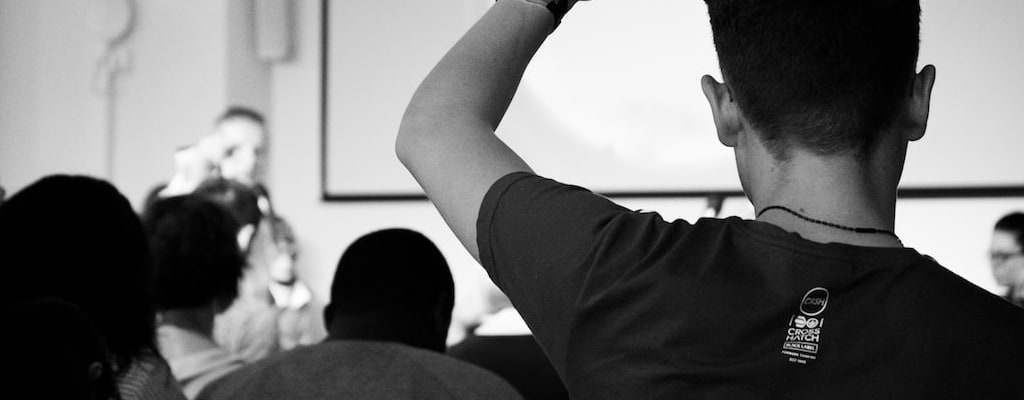meet halfway: Idiom Meaning and Origin
What does ‘meet halfway’ mean?
The idiom meet halfway means to make a compromise or come to an agreement by each side giving in or making concessions.

Idiom Explorer
The idiom "split the difference" means to reach a compromise or settlement by each party giving up something and finding a middle ground that is halfway between their initial positions.
"See eye to eye" is an idiom that means to agree or have the same opinion as someone else.
"Play both sides against the middle" means to manipulate or exploit two opposing parties or groups in order to benefit oneself or reach a personal advantage. This idiom suggests a strategic move of pitting two opposing forces against each other while positioning oneself in the middle to leverage the situation for personal gain.
The idiom "play along" means to pretend to agree or go along with something, usually for the sake of keeping the peace or avoiding conflict.
The idiom "pitch in" means to join in and help or contribute to a task or activity.
The idiom "patch up" means to repair or fix something, often referring to relationships or conflicts that need resolving. It implies resolving issues by finding a solution or compromising to restore harmony.
The idiom "parting of the ways" refers to a situation where two or more people or groups are going in different directions or have different opinions, leading to a separation or disagreement.
The idiom "other half" refers to someone's romantic partner or spouse, with the implication that they complete or complement each other.
The idiom "on the same page" means to be in agreement or understanding about something.
The idiom "on average" means the typical or usual amount or quality of something when considering all the different instances or occurrences.
Compromise Unveiled
In the idiom "meet halfway," the word "meet" is used metaphorically to mean reaching an agreement or compromise between two parties. The word "halfway" represents an equal distance or effort from both sides involved. This idiom is commonly used in situations where two people or groups have different opinions, desires, or goals, and need to find a middle ground to achieve a mutually satisfactory outcome.
The idiomatic expression "meet halfway" has its origins in the physical act of meeting someone in the middle. The concept of meeting halfway or coming to a compromise is rooted in the idea of fairness and equity. It suggests that both parties involved should make equal contributions or concessions in order to establish a balanced solution.
This idiom is often used in interpersonal relationships, negotiations, and discussions, as it highlights the importance of cooperation and finding a common ground. It encourages individuals to be willing to give up some of their original demands or desires in order to meet the other person's needs and reach a mutually agreeable solution.
The idiom "meet halfway" can also be seen as a strategy for effective communication and problem-solving. Instead of stubbornly holding onto one's position, this idiom urges individuals to be open-minded, flexible, and willing to find a middle point that satisfies both parties. It emphasizes the value of collaboration and the benefits that can arise from finding a compromise.
It is important to note that the idiom "meet halfway" does not imply a literal meeting at exactly half the distance between two points, but rather suggests an equal distribution of effort or compromise from both sides. The idiom conveys the idea that when both parties are willing to meet each other halfway, harmony, understanding, and resolution are more likely to be achieved.
The idiom "meet halfway" is an expression used to describe the act of reaching a compromise or agreement by both parties involved. It originated from the concept of meeting someone in the middle physically. This idiom promotes cooperation, fairness, and open-mindedness in interpersonal relationships and negotiations. By being willing to make equal contributions and concessions, individuals can find common ground and achieve mutually satisfactory outcomes. The idiom "meet halfway" encapsulates the essence of compromise and the importance of finding balance in different aspects of life.
The related idiom "split the difference" is also commonly used in situations where two parties have divergent opinions or desires. Similar to "meet halfway," this idiom suggests finding a middle ground. However, "split the difference" specifically refers to dividing the difference between two points or opinions equally. It often implies that both parties should be willing to make concessions and meet each other halfway, with each side giving up a portion of their original position.
Similarly, the idiom "happy medium" is connected to the concept of "meet halfway." It emphasizes the idea of finding a balance or compromise that brings satisfaction to both parties. "Happy medium" suggests that there is an ideal point or position that can be reached where both parties are content. It encourages individuals to consider the needs and desires of others while finding a solution that is fair and acceptable to everyone involved.
The idiom "meeting of the minds" is another related expression that underscores the importance of finding a common understanding or agreement. It implies that both parties have reached a state of shared understanding and have aligned their thoughts, goals, or perspectives. "Meeting of the minds" signifies a meeting of two parties' mental perspectives, suggesting a convergence of ideas, opinions, or beliefs. It is often used to describe situations where individuals have overcome their differences and established a mutual understanding or agreement.
The idiom "make ends meet" is tangentially connected to the concept of compromise represented by "meet halfway." It refers to the act of managing financial resources in a way that allows a person or household to cover all necessary expenses. While not directly related to negotiations or interpersonal relationships, "make ends meet" highlights the necessity of finding a balance or compromise between income and expenses. It indicates the importance of budgeting, prioritizing, and making adjustments to ensure financial stability.
Lastly, the idiom "measure up" can also be associated with the idea of "meet halfway." This expression emphasizes the need for individuals to reach a certain standard or level of performance. In the context of "meet halfway," "measure up" suggests that both parties should meet or exceed the expectations or requirements of a situation or agreement. It underlines the importance of meeting the mutual objectives or standards agreed upon by both parties for a satisfactory outcome.
Example usage
Examples:
- After a long negotiation, they finally agreed to meet halfway and split the costs of the project.
- We couldn't decide on a restaurant for dinner, so we decided to meet halfway and find a place that we both liked.
- In order to reach a compromise, both political parties need to be willing to meet halfway and find common ground.
The idiom "meet halfway" is primarily used in situations where two parties or individuals are trying to reach a compromise or agreement. The phrase implies that both sides are willing to make concessions or adjustments to find a middle ground. It can be applied to a variety of contexts, such as negotiations, decision-making, or resolving conflicts. The idiom suggests the importance of collaboration, flexibility, and finding a fair resolution for all parties involved.
More "Negotiation" idioms



